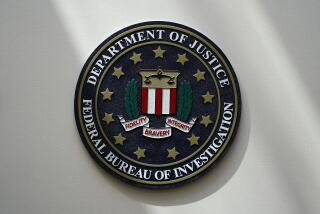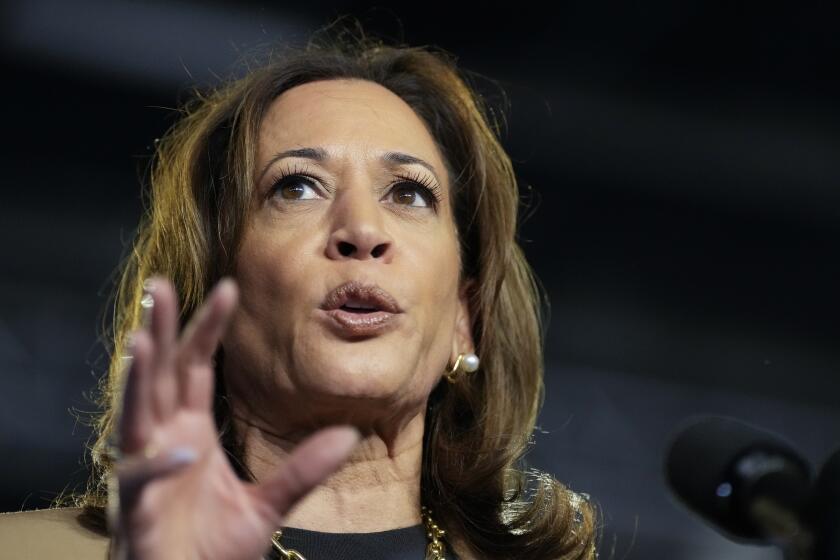Details of Sept. 11 Plot Elude U.S. Investigators
WASHINGTON â For more than seven months, U.S. authorities probing the Sept. 11 attacks have scoured everything from caves to credit cards in the expectation that they would ultimately discover how the 19 hijackers plotted their brazen scheme.
But the global search has produced virtually nothing in the way of hard evidence about the terroristsâ planning, and authorities said Monday that they face the growing realization that they may never know many key details.
That sobering conclusion underscores the skill and sophistication of the Al Qaeda terrorist network in its ability to conceal its activities--and the equally daunting difficulties that authorities face in heading off another attack, officials said.
The hijackers âleft no paper trail,â FBI Director Robert Mueller said in the text of a speech that the FBI released Monday. âIn our investigation, we have not uncovered a single piece of paper--either here in the United States or in the treasure trove of information that has turned up in Afghanistan and elsewhere--that mentioned any aspect of the Sept. 11 plot.â
His remarks offer the FBIâs most comprehensive and detailed assessment to date of its investigation, remarkable as much for what investigators have not found as for what they have.
Mueller revealed that investigators believe the Sept. 11 plan may have been in the works for as long as five years, and that the hijackers used âmeticulous planning, extraordinary secrecy and extensive knowledge of how America worksâ to conceal their scheme after entering the United States legally from the Middle East.
Investigators have found no computers, laptops, hard drives or other storage media that may have been used by the hijackers, who hid their communications by using hundreds of pay phones and cell phones, coupled with hard-to-trace prepaid calling cards.
In executing wire transfers to fund the attacks, they were also careful to send money in small amounts, avoiding large cash transactions that would have triggered a government report, Mueller said, adding: âThe hijackers did all they could to stay below our radar.â
The FBI and other U.S. intelligence agencies have come under intense scrutiny since Sept. 11, and some analysts suggested that Muellerâs comments, made in a speech to the Commonwealth Club in San Francisco on April 19, may reflect an attempt to rationalize the intelligence communityâs failure to pick up on any signs that an attack was imminent.
In hindsight, several episodes conceivably could have alerted authorities to a possible plot, including indicted Al Qaeda member Zacarias Moussaouiâs suspicious activities at a Minnesota flight school and the entry of two of the hijackers into the country even though they were on a CIA terrorist âwatch list.â
But even now, law enforcement officials say that while they have been able to reconstruct the movements of the hijackers in the months before the attacks--all legal except for a few speeding tickets--they have found no evidence of their plotting.
âWeâve been able to glean quite a bit in tracking their movements, but as far as being able to identify a blueprint, some type of master plan that was shared with a number of people outlining just how they were going to pull this off, thatâs something weâve not been able to uncover,â said an FBI official who asked not to be identified.
Indeed, the White House is deeply concerned about the lack of any evidence that could have foreshadowed the events of Sept. 11. That is one reason why U.S. counter-terrorism authorities intend to keep the nation on an indefinite state of heightened alert, according to a Bush administration official who also asked not to be identified.
The paucity of information âconfirms what we have thought for a long time. If there was any doubt about the professionalism of the hijackers, the [FBI] directorâs quotes should dispel that,â the official said. âIf it took . . . years to develop the 9/11 plot, then it is very, very possible that we are in a similar period right now, where individuals are practicing the same type of operational security in preparation for another attack.â
Even Muellerâs assessment that the Sept. 11 attacks were in the works for five years is largely âa suppositionâ based on somewhat vague intelligence culled from tracking European terrorism suspects, according to a law enforcement official. âThere was never even anything saying, âSomething is planned in the United States,â â the official said.
In a slew of attacks in Europe, Africa and the United States during the 1990s that were linked to Al Qaeda and its leader, Osama bin Laden, evidence inevitably would turn up after the fact revealing how the plans were laid, said terrorism expert Daniel Benjamin, a National Security Council aide in the Clinton administration.
But Muellerâs assessment about the Sept. 11 plot âdeepens the sense that these guys [in Al Qaeda] have really taken a quantum leap in their ability to carry out an operation without all the traditional accouterments,â he said.
Whether the hijackers never maintained a paper trail or managed to destroy the evidence before the attacks, Benjamin said, âitâs incredibly scary. Itâs premature to declare the record closed, and there may be something else out there that hasnât come out yet, but the fact that nothing has turned up is an indication of just what a skillful operation this was.â
William Wechsler, a former National Security Council official who specialized in Al Qaeda financing, agreed that the Sept. 11 hijackers managed to avoid basic missteps that had flawed earlier operations.
âThis shows we canât rely on the incompetence of terrorists to protect usâ anymore, Wechsler said. âThe level of sophistication that they have shown in their ability to hide for so long among us . . . should make every American concerned that they could be doing the very same thing today.â
Indeed, Mueller acknowledged the tremendous challenges that U.S. law enforcement faces in heading off another attack. In his remarks, he said the nation has not done enough to stop it.
âTerrorists have shown they are willing to go to great lengths to destroy America,â he said. âWe must be willing to go to even greater lengths to stop them. Our worldwide network must be more powerful. Our financial commitment must be stronger. Our techniques and training must be more sophisticated. And our sense of urgency and intensity must be greater.â
Mueller said the FBI was doubling the number of agents working on terrorism prevention--a commitment that goes beyond his previous pledges. And the bureau is hoping to speed its terrorist information flow by putting in a new computer system next year--replacing a network that he said is âpiecemeal and patchwork.â
Shutting down the terroristsâ money pipelines is another priority, Mueller said. Problems in this area have surfaced in the last few months involving poor coordination among federal agencies and questionable evidence against targeted Islamic groups, but Mueller said the FBI has managed to review 75,000 transactions and help freeze millions of dollars in terrorist money worldwide.
Authorities at the Treasury Department, which is also investigating terrorist money ties, are concerned about the new evidence regarding Al Qaedaâs ability to hide its financial tracks, department spokesman Rob Nichols said.
âItâs clear the Al Qaeda use extremely clever and crafty ways to move around, access and hide their money,â Nichols said. âThis fact underscores the importance of choking off funds that enable terrorist organizations to thrive and to identify on an ongoing basis suspected financial intermediaries of global terror.â
More to Read
Sign up for Essential California
The most important California stories and recommendations in your inbox every morning.
You may occasionally receive promotional content from the Los Angeles Times.










